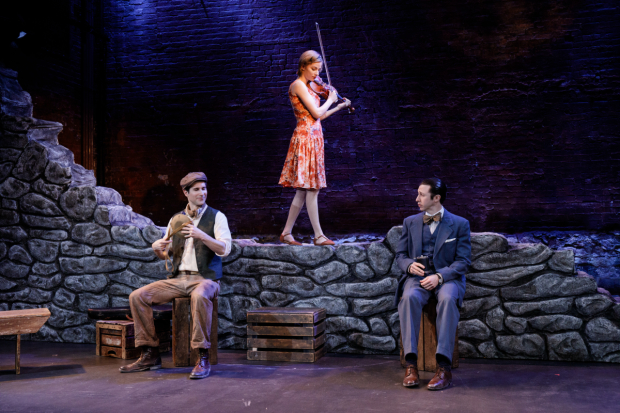A Walk With Mr. Heifetz Imagines a History-Making Stroll Through Palestine
Primary Stages premieres James Inverne’s musical exploration of Jewish history.

(© James Leynse)
Celebrated violinist Jascha Heifetz visited a pre-Israel Palestine in 1926 to play an outdoor concert for his throngs of admirers. After the performance, he met composer Yehuda Sharett (brother of future Israeli Prime Minister Moshe Sharett), the pair walked and talked into the night, and Yehuda returned via taxi to his kibbutz the following morning barefoot. What did they talk about? What happened to Yehuda's shoes? Those are details for James Inverne to spin from this crumb of musical folklore in his new play A Walk With Mr. Heifetz, a Primary Stages production now running at the Cherry Lane Theatre. It's a narrative skeleton that needs a strong perspective to fill the holes and carve the contours — a service Inverne unfortunately shies away from in the two stagnant scenes he imagines (and Primary Stages artistic director Andrew Leynse directs) for the stage.
A Walk With Mr. Heifetz opens in the midst of its titular walk. A coiffed and manicured Heifetz (Adam Green) and his unpolished kibbutznik host Yehuda Sharett (Yuval Boim) stroll along, first admiring the Palestinian landscape, then transitioning into conversation about their parallel immigrant backgrounds. Heifetz hails from Russia but his music career landed him in the United States, while the Zionist Sharett family moved to Palestine from the Ukraine with the deliberate intent of joining and molding a Jewish state. Heifetz, an international celebrity, now finds himself motivated by self-advancement, while Yehuda, a local figure, is motivated by collective Jewish progress. Music is their common tool, and yet (at least as Yehuda sees it) the ego with which Heifetz strives for perfection negates the purpose of that perfection altogether.
These are all astute observations made by a writer who has thought deeply about Israeli history and the role music had in shaping it. Inverne, however, forgets to infuse his thoughts with dramatic stakes to make his characters more than just mouthpieces for his reflections — Green and Boim doing what they can to inject character into their dialogue with the assistance of Jen Caprio's instructive costumes , which effectively demarcate these two men's contrasting economic and social statuses . At the end of Act 1, Heifetz chivalrously sends Yehuda off in a taxi with the fateful suggestion to study music in Germany — a cliffhanger whose dramatic possibilities are abandoned at the top of Act 2 (preceded by an unnecessary intermission during which Wilson Chin's stone quarry set is laboriously changed to the inside of Yehuda's home).
Here, we see Yehuda 19 years later in 1945. World War II has just ended and David Ben-Gurion is less than three years from proclaiming the independent State of Israel. This older Yehuda is much more solemn than the young man we meet in Act 1. He's suffered loss, drifted from his music, and now talks dejectedly with his politician brother Moshe about his Zionist ideals (Erik Lochtefeld portraying Moshe with the sophistication of a learned man who's surpassed his younger brother's humble status). Rather than building on Yehuda's conversation with Heifetz, we're sent back to the starting gate to rehash the same points: The power of music to unite a people, the dream of a Jewish state, and the tug-of-war between altruism and ego (this time of politicians rather than showy musicians). The insights are valid and well-expressed, but without a narrative motor to drive them forward, they simply rev up a treadmill that keeps Inverne's audience and characters frustratingly stuck.
Violinist Mariella Haubs is the most moving element of the production (both literally and figuratively speaking, considering the small amount of stage business Leynse was able to give the actors). In her extraordinary playing, which slips in and out of the background, we feel the visceral impact that music can have on a group of people — a concept that takes Yehuda paragraphs to explain. It's a peek into the emotional dimensions the play could have explored, and a disappointing realization of how much was left on the table.







